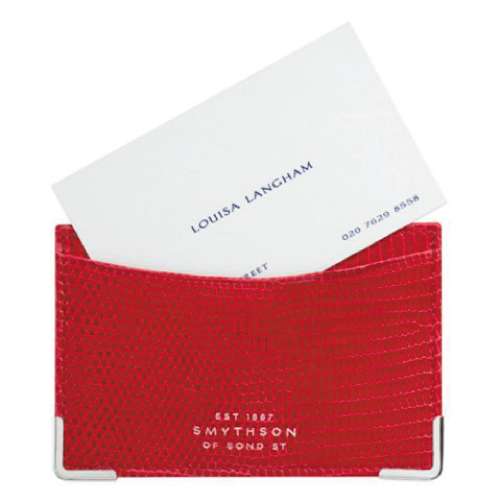Royal stationer sells gifts made of rare lizard skins

Smythson, the Queen's stationer which employs the wife of the Conservative leader, David Cameron, as its creative director, is selling luxury gifts bound with the skins of rare lizards.
The Independent has discovered that the fashionable store is offering its wealthy clientele at least a dozen products made from the hides of wild reptiles for between £250 and £1,200.
Although legal, conservationists say the trade in "exotic leather" is barbaric and damaging to wild populations of scarce species. According to one expert, the animals are often skinned alive.
Smythson declined to deny the alleged cruelty but stated that it had the necessary permits for the sale of the products under the Convention in the Trade in Endangered Species (Cites).
Founded in 1887, the retailer has become highly fashionable thanks to Samantha Cameron, and is a supplier to the Queen, the Duke of Edinburgh – the honorary president of the World Wide Fund for Nature (WWF) – and the Prince of Wales. Most of its wallets, purses, notepads and bags are made from the hides of domestic meat animals such as pigs as well as farmed ostriches and alligators. At its shops in New Bond Street and Sloane Street in London and online it sells at least a dozen items upholstered with wild lizards. They are not included in brochures nor advertised in store. Smythson declined to identify the species used. But details of import permits for lizards have been obtained from Animal Health, a Government agency, using freedom of information legislation. Three main species have been brought into the UK by businesses: the Nile monitor (Varanus niloticus); common tegu (Tupinambis merianae); and the water monitor (Varanus salvator). All are listed under Appendix II of Cites – although they are not threatened with extinction, their trade must be controlled "in order to avoid utilisation incompatible with their survival".
Clifford Warwick, a biologist who has witnessed lizards being snared and then macheted, said: "The hunters will then cut their heads off and skin them. In most cases they are alive when they are skinned." The animals had such a slow metabolism that when decapitated, they could be alive for up to an hour, he said. "If most people witnessed it they simply wouldn't buy these things," he added. "It's unfortunate when people with such a high profile as the Royal Family are using a shop selling products with such an awful history."
The retailer said in a statement that it sought to meet industry "best practice". It added: "Where this relates to exotic leathers, which represent less than 0.5 per cent of our business, all products are sourced from suppliers who comply with the relevant Cites legislation and we hold Cites documentation for the exotic products traded."
Lizards brought to Britain
Although it remains uncertain which types of lizard have been used, three species have been imported into the UK in recent years, according to the government agency Animal Health.
*The Nile monitor, a member of the Varanidae family and found in Africa, is renowned for a fierce temperament, with its powerful bite and lashing tail.
*The South American common tegu is more often found in the pet trade. Argentina's black and white variety is said to be the most docile of the species while the gold, or Colombian tegu, is smaller, up to four feet long.
*Close in size to the Komodo dragon, water monitors are a larger lizard that can grow up to 10 feet long. They have muscular bodies with long, powerful tails and are opportunistic in their feeding. They eat small mammals, from rats to monkeys, and it has been known for larger adults to attack deer. The water monitor, from south-east Asia, has been designated a protected species in Hong Kong.
Join our commenting forum
Join thought-provoking conversations, follow other Independent readers and see their replies
Comments
Bookmark popover
Removed from bookmarks